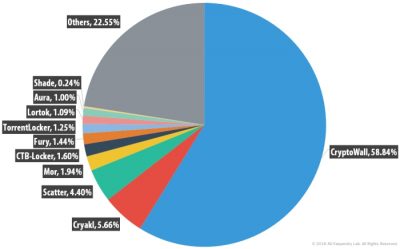According to a study conducted by Kaspersky Lab, crypto-ransomware attacks have seen a tremendous growth in the recent months. In the year 2015-16 alone, the attacks have shockingly increased 5.5 times in comparison with the same period during the year 2014-15. As a result, the malware infection caused victims fall into the trap and pay for decryption of the data encrypted by ransomware in huge numbers.

Rising crypto-ransomware attacks is a sign of danger
Fedor Sinitsyn, Senior Malware Analyst at Kaspersky Lab, said:
“The biggest problem with crypto-ransomware today is that sometimes the only way to get the encrypted data back is to pay the criminals, and victims tend to pay. That brings a lot of money into the underground ecosystem that has grown up around this malware, and as a result, we are seeing new cryptors appear almost daily.”
The study shows ransomware attacks globally rose by 17.7% to 2,315,931 during 2015-16 from 1,967,784 during the same period in 2014-15. However, the crypto-ransomware attacks increased 5.5 times from 131,111 in 2014-2015 to 718,536 in 2015-2016. As per the study, countries such as Germany, Italy and the US have suffered from the highest percentage of crypto-ransomware attacks during the said period. Ransomware in India is also on the rise and it is the 5th most attacked country.
In the event that you have no idea what crypto-ransomware is and why you should take these attacks seriously, it’s a sort of malware that exploits a computer further to restrict user access to the infected system and displays on-screen alerts to extort money from victims. It’s a very serious problem that compromises company’s reputation and sensitive or proprietary information.
Kaspersky also explained, companies can get rid of such issues if ransomware prevention measures in terms of regular backups and staying informed about current cyber security risks are put into action. However, these growing numbers of attacks clearly indicate that the ransomware business model is being considered lucrative and trustworthy by cyber criminals over the period.
Leave a Reply